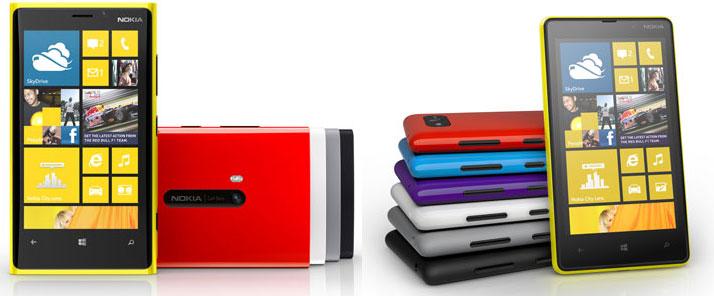While rumors persist that Apple is planning to launch a low-cost iPhone, Nokia is set to unveil its own inexpensive handset at next week's Mobile World Congress.
In addition to a lower-priced version of its Lumia smartphones series running Windows Phone 8, Nokia is also set to launch a basic phone that will compete with budget players like Huawei and ZTE, which are popular in China. The models will be unveiled in Barcelona next week at the Mobile World Congress industry show, according to Reuters, which cited unnamed company sources.
Nokia's Lumia 920 (left) and Lumia 820 (right).
Just how much cheaper the new Nokia Lumia handsets will be remains to be seen. The company's current flagship device, the Lumia 920, is available through AT&T for $99.99 with a new two-year service contract, or $100 less than Apple's least expensive iPhone 5 model.
AT&T also caries Nokia's current low-end Lumia 820 for $49.99, while the company's previous-generation Lumia 900 is available for 99 cents with a new contract.
Nokia's apparent interest in the low-end market comes as Apple is rumored to be working on its own less expensive iPhone model designed for emerging markets like China and Brazil. On Friday, analyst Katy Huberty with Morgan Stanley expressed increased confidence that Apple will release a cheaper "iPhone mini" to continue its growth.
An estimated 65 percent of the current smartphone market is driven by inexpensive handsets that are purchased by customers who do not want to be locked in to a two-year service contract. While Apple competes in the $400-and-up high-end market, it's estimated that most sales — 580 million — come in below that price point.
Currently, Apple's cheapest iPhone without a contract is the iPhone 4, which is available for $450 in the U.S. But local taxes increase the price to $490 in China, and $750 in Brazil.
Nokia's Lumia 920 also costs more than $600 without a carrier contract in the U.S., as well as some European markets.
 Sam Oliver
Sam Oliver








 Charles Martin
Charles Martin

 Malcolm Owen
Malcolm Owen
 William Gallagher
William Gallagher
 Christine McKee
Christine McKee
 Marko Zivkovic
Marko Zivkovic
 Mike Wuerthele
Mike Wuerthele










16 Comments
No, "rumors don't persist" it's the same rumor bouncing around the internet, getting re-re-re-reported over and over again.
So everyone is now going after the "emerging markets".
A few days ago Samsung announced a new entry-level model line, the Rex (likely Tizen-OS) to answer Nokia's current base model line-up. Now Nokia announces they're going to better address those same emerging-market needs with a much less expensive basic model(s) that may or may not be Windows-based? It may get crowded fast.
Apple is not afraid of crowded markets. If 580 million sales occur below $400 there is a huge opportunity for Apple simply because those cheap Android phones truly suck. Android is actually a far tougher competitor with the expensive flagship type models phones because they offer some features not found on the iPhone like larger displays. They also do not suffer the same problems as the cheap Android phones because they have far more ram, internal storage, powerful CPU, and run Jellybean. But these cheap Android phones often are far slower, have smaller displays, suffer crashes from lack of enough internal storage, and many other issues.
If Apple could introduce a phone to truly compete in this market space it would wipe the floor with Android. Let's not also forget the status symbol importance for many in poorer countries that comes with owning a premium brand like Apple.
How does anyone in Brazil even afford to buy any phone if they add $350 tax to just an iPhone 4?
Apple is not afraid of crowded markets. If 580 million sales occur below $400 there is a huge opportunity for Apple simply because those cheap Android phones truly suck. Android is actually a far tougher competitor with the expensive flagship type models phones because they offer some features not found on the iPhone like larger displays. They also do not suffer the same problems as the cheap Android phones because they have far more ram, internal storage, powerful CPU, and run Jellybean. But these cheap Android phones often are far slower, have smaller displays, suffer crashes from lack of enough internal storage, and many other issues.
If Apple could introduce a phone to truly compete in this market space it would wipe the floor with Android. Let's not also forget the status symbol importance for many in poorer countries that comes with owning a premium brand like Apple.
How does anyone in Brazil even afford to buy any phone if they add $350 tax to just an iPhone 4?
Most of the announcements so far appear to using proprietary OS's, not Android. I'm not sure Android can be licensed without Google services, which might make Android too expensive a build to be used for basic "dumbphones". I think that may be the reason for the recent mention of proprietary OS's like Tizen, Bada, Brew and the like. They may need require the hardware that Android licensing needs. Dunno.
Most of the announcements so far appear to using proprietary OS's, not Android. I'm not sure Android can be licensed without Google services, which might make Android too expensive a build to be used for basic "dumbphones". I think that may be the reason for the recent mention of proprietary OS's like Tizen, Bada, Brew and the like. They may need require the hardware that Android licensing needs. Dunno.
Not sure I follow you. That 580 million figure was for smart phones selling under $400. If you included dumb phones with brew and the like it would be many billion. The vast majority of those 580 million cheap smart phones currently being sold here in the U.S. and around the world are Android phones.